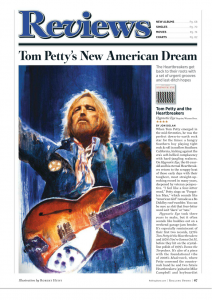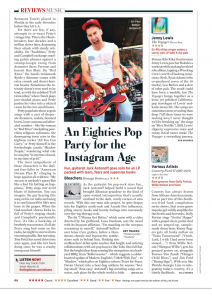Reviews: Tom Petty's New American Dream
By Jon Dolan
Rolling Stone #1214 - July 31, 2014
The Heartbreakers get back to their roots with a set of urgent grooves and last-ditch hopes
Tom Petty and the Heartbreakers | Hypnotic Eye | Reprise/Warner Bros | ★★★★
When Tom Petty emerged in the mid-Seventies, he was the perfect down-to-earth rock star for the times: a hungry Southern boy playing tight rock & roll in mellow Southern California, kicking against the era's soft-bellied complacency with hard-jangling realness. On Hypnotic Eye, the 63-year-old and his eternal Heartbreakers return to the scrappy heat of those early days with their toughest, most straight-up-rocking record in many years, deepened by veteran perspective. "I feel like a four-letter word," Petty sings on "Forgotten Man," which sounds like "American Girl" remade as a Bo Diddley roof-rumbler. You can be sure as shit that four-letter word isn't "darn" or "rats."
Hypnotic Eye took three years to make, but it often sounds like buddies out on a weekend garage-jam bender. It's especially reminiscent of their first two records, 1976's Tom Petty & the Heartbreakers and 1978's You're Gonna Get It!, before they hit on the crystal-line polish of 1979's Damn the Torpedoes. It's also of a piece with the foundational vibe of 2008's Mudcrutch, where Petty convened the country-rock band he and two future Heartbreakers (guitarist Mike Campbell and keyboardist Benmont Tench) played in Florida in the early Seventies before they hit L.A.
Yet there are few, if any, attempts to re-enact Petty's vintage hits. This is the Heartbreakers four decades and a million shows later, deepening their attack with study reliability. On "Faultlines," Petty and Campbell exchange snarling guitar phrases against a swamp-boogie swing from drummer Steve Ferrone and bassist Ron Blair. On "Red River," the band's trademark Byrds-y shimmer comes with extra crunch and desert-horizon beauty. Sometimes the intensity doesn't even need to be loud, as with the subdued "Full Grown Boy," where Tench plays jazz-shaded piano and Petty pushes his voice into a relaxed croon for the wee small hours.
Petty populates these urgent songs with a cast of desperate dreamers, zealots, doomed lovers, loose cannons and alienated zombies—like the woman in "Red River" stockpiling powerless religious tailismans, the doomsaying town crier in the highway rocker "All You Can Carry," or Petty himself in the forebodingly caustic "Shadow People," wondering what role he can play "in my time of need, in my time of grief."
The most sympathetic of these characters is the defiant free-faller in "American Dream Plan B," clinging to hope against all evidence. "My success is anybody's guess/But like a fool I'm betting on happiness," Petty sings over acrid blasts of distortion. You can imagine the guy hearing this song on his car radio and using it to steel himself for life's next knee in the grapes. When the God-touched chorus kicks in, full of Petty's ringing chords and Campbell's psychedelic fuzz, it's like a backslap of brotherly reassurance. If a Katy Perry song had come on the radio, he might've swerved into oncoming traffic. But not today. Tom Petty has saved drive time once again, just like he's been doing since he was a cranky young man himself.

